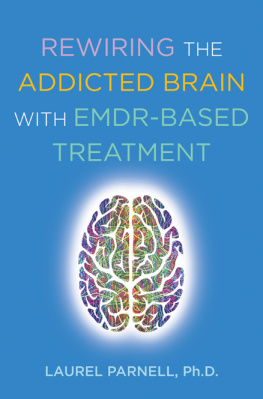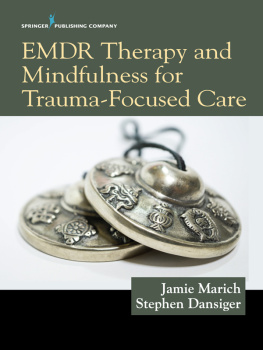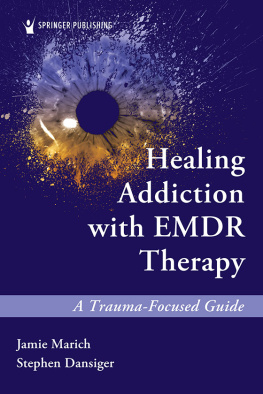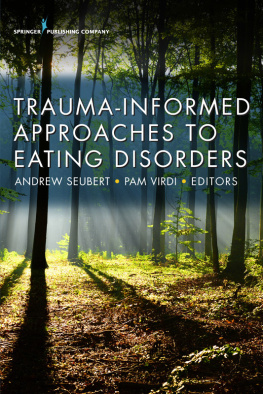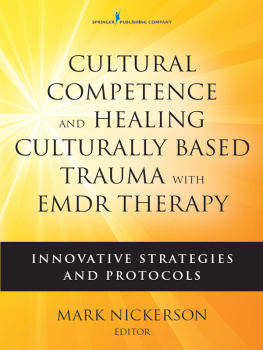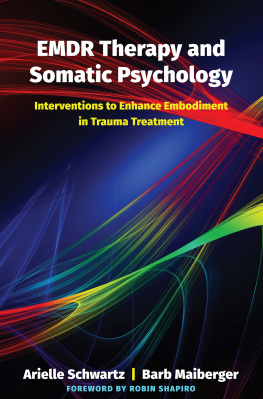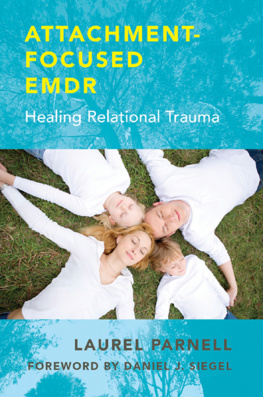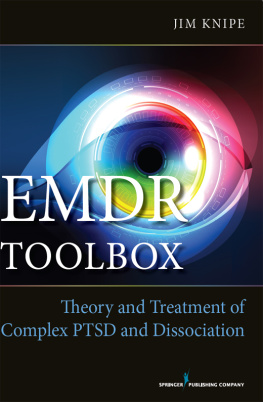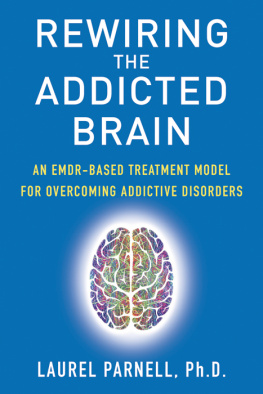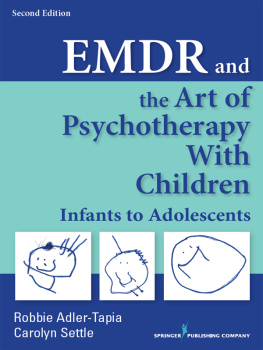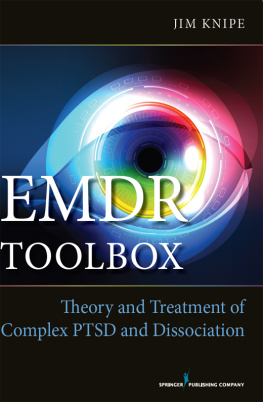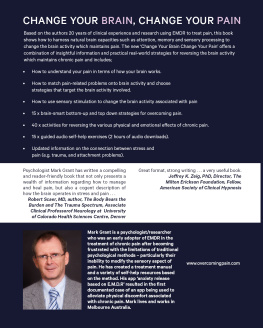
REWIRING THE ADDICTED BRAIN
WITH EMDR-BASED TREATMENT
REWIRING THE
ADDICTED BRAIN
WITH EMDR-BASED
TREATMENT
Laurel Parnell

W.W. NORTON & COMPANY
Independent Publishers Since 1923
A NORTON PROFESSIONAL BOOK
To all those who are struggling with addictions and addictive behaviors, and to their family members and friends.
Why do you stay in prison when the door is so wide open?
RUMI
I have spent my 30-year career as a clinical psychologist working with people who have experienced trauma. I have worked in clinics serving low-income children, youth, and adults, as well as in private practice, treating clients with a range of presenting problems. I have trained thousands of therapists worldwide in the trauma therapy, Eye Movement Desensitization and Reprocessing (EMDR) and provided consultation on thousands of cases.
Through all my work with traumatized people, I have noted the co-occurrence of trauma and substance use and abuse and addictive disorders. I have seen how people who have experienced trauma from abuse, neglect, poverty, divorce, loss, and discrimination often turn to substances or behaviors to help manage unmanageable feelings. People raised in unstable families where parents or caregivers struggle with addiction or trauma may not have their early attachment needs met in a way that allows them to develop a secure sense of self and the capacity to soothe themselves when distressed. As they grow into adolescence or early adulthood and discover that substances or behaviors provide short-term symptom relief, they fall into addictive patterns.
Addiction can also develop in people without histories of trauma. They may have a genetic vulnerability or become addicted to a medication originally prescribed for pain or attention deficit disorder.
Effective treatment of addiction requires a holistic approach that takes into consideration its underlying causes and current behaviors and patterns. Techniques to aid in emotional regulation as well as attachment repair are required. Methods derived from what I call Attachment-Focused EMDR and Resource Tapping can yield excellent results in a milieu that has proven very difficult to treat with more traditional approaches.
WHY THE NEED FOR THIS BOOK?
Most of us in the United States have friends or family members who struggle with addictions or addictive disorders. Some of us may struggle with such addictions ourselves. The pain and impact of these disorders is tremendous. Over the years, I have been frustrated with what I have observed to be a limited approach to the treatment of addictions that does not adequately take into consideration the complexity of each persons situation and the drivers for their behaviors. In my opinion, addiction treatments one-size-fits-all approach has not kept up with what we know about addiction itself, or what we know about brain science, trauma, and disordered attachment.
Rewiring the Addicted Brain with EMDR-Based Treatment is my attempt to create a brain-wise, compassionate, resilience-supporting approach to the treatment of addictions that I wish my family members and all others struggling with addictions could access. Therapists and substance abuse counselors can use this as a guidebook to help them navigate the difficult and complex terrain of addiction treatmentone that recognizes and addresses trauma and integrates repair of attachment deficits. With this guidance, I believe many more people can be effectively helped and can then go on to live fuller, more fulfilled lives.
Because I wanted to reach as large a group of therapists as possible, I chose to write a book that is not primarily for EMDR-trained clinicians. This book was written for therapists, substance abuse counselors, and laypeople seeking user-friendly tools to help support themselves in recovery. It is full of EMDR-based techniques that can be easily integrated into all levels of addiction treatment.
Distinctions: EMDR and Resource Tapping
EMDR is a powerful trauma therapy that is only taught to licensed mental health practitioners. It can open up deep emotions and dissociated early memories for which clinical experience and advanced skills and training are required. Most of the counselors working in the field of substance abuse are not licensed mental health professionals and so would not qualify to be trained in EMDR.
Many EMDR-trained therapists have found that an EMDR-related technique called Resource Tapping can be helpful in the treatment of addictive disorders. These therapists who use Resource Tapping report reductions in their clients craving for substances and their anxiety levels, in addition to an increase in self-esteemeven without the use of EMDR to reprocess the traumas. In many cases, the therapists never needed to employ the more intensive and demanding EMDR trauma-processing work, as the clients symptoms cleared with the use of Resource Tapping alone. I wrote Tapping In to support non-EMDR therapists and laypeople in using this simple technique.
Though this book focuses primarily on integrating Resource Tapping techniques into the treatment of addictions, I also include ways EMDR can be employed, and certain sections of the book will apply more to those trained in EMDR. For those without EMDR training, it will still be useful to help all readers understand how this therapy might be beneficialwhere a referral to an EMDR therapist would make sense.
HOW THIS BOOK IS ORGANIZED
The emphasis in Rewiring the Addicted Brain with EMDR-Based Treatment is on the practical clinical application of principles and techniques helpful for addictions and addictive disorders. Case material is interwoven throughout the text; also included are chapters presenting in-depth cases that illustrate the techniques. These cases include history and background on the clients as well as actual sessions employing the interventions specific to rewiring the addicted brain. Also included in the case history chapters are details on the rationale for the interventions used, information about the effects of those interventions, and context around the overall course of treatment.
I have been teaching and presenting the material in this book for many years and use it in my clinical practice. The protocols and Resource Tapping techniques presented here evolved over several years, based on trial and error and feedback from therapists I have taught. I am always interested in what works, as well as in new ideas. I am deeply grateful to all of the talented clinicians who have shared with me their experiences with their clients so that I can share them with you.
Many people struggling with addictions know all they need to know about overcoming them. Theyve been to meetings and treatment. Theyve read self-help books. They know so much about it that they could teach a class or give someone else great advice, yet they have difficulty applying what they know to their own lives and addictions. This, of course, is not because they are in denial; rather, it is because the part of the brain that has all of this information is not linked up with the part that is driven by the urges. There is a lack of communication in the brain. They know, but part of them doesnt know. Its like a powerful race car that cant get into gear to move out of the garage and onto the road. The potential is there without the means to utilize it.
Therapists can help clients actualize this potential for change.
Rewiring the Addicted Brain with EMDR-Based Treatment is divided into five parts. You will find tools and techniques for supporting clients in addiction recovery in all five parts.
Next page
